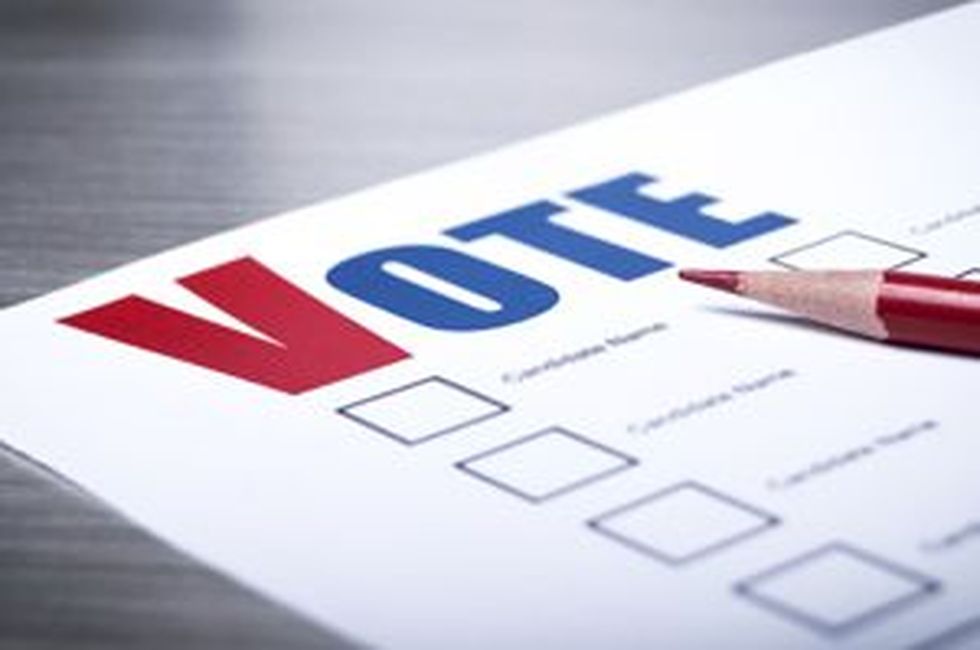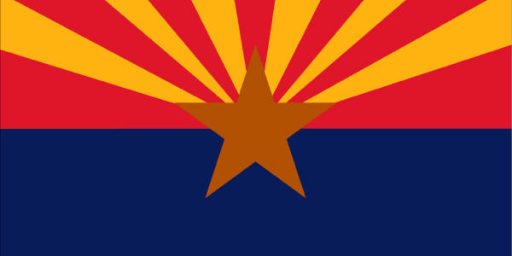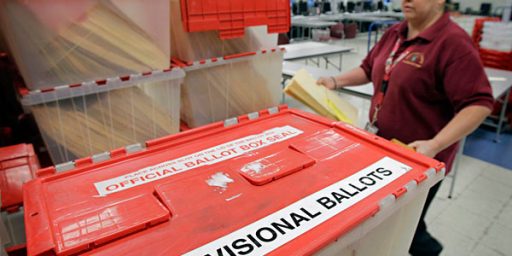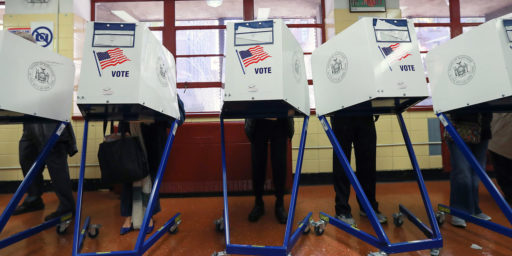SCOTUS Upholds Arizona Voting Rules
A completely unsurprising 6-3 decision.

A Republican-dominated Supreme Court this morning issued another ruling granting wide deference to state legislatures in crafting voting rules and, according to some critics, further gutting the Voting Rights Act of 1965 (as amended).
NPR‘s Nina Totenberg (“The Supreme Court Deals A New Blow To Voting Rights, Upholding Arizona Restrictions“):
The U.S. Supreme Court on Thursday narrowed the only remaining section of 1965 Voting Rights Act, rendering the landmark civil rights law close to a dead letter.
Arizona had banned so-called “ballot harvesting” as well as a policy that threw out an entire ballot if it was cast in the wrong precinct.
The 6-3 vote was along ideological lines. Justice Samuel Alito write the majority opinion for the court’s conservatives. Justice Elena Kagan and the court’s two other liberals dissented.
The “Court declines in these cases to announce a test to govern all VRA [Section 2] challenges to rules that specify the time, place, or manner for casting ballots,” Alito wrote. “It is sufficient for present purposes to identify certain guideposts that lead to the Court’s decision in these cases.”
The landmark law, widely hailed as the most effective piece of civil rights legislation in the nation’s history, was reauthorized five times after its original passage in 1965, but for all practical purposes, all that is left of it now is the section of the law banning vote dilution in redistricting, based on race.
Eight years ago, the court by a 5-to-4 majority gutted the law’s key provision, which until then required state and local governments with a history of racial discrimination in voting to get approval from the U.S. Justice Department for any changes in voting procedures.
When that provision was struck down by the court in 2013, the only protections for voting rights that remained in the law were in Section 2.
Though Section 2 has largely been used to prevent minority vote dilution in redistricting, importantly, it does bar voting procedures that “result in a denial or abridgment of the right of any citizen of the United States to vote on account of race or color.” So the Arizona case was viewed as particularly important because it was the first time the court dealt with a claim of vote denial under Section 2 and how to evaluate it.
“This Court has no right to remake Section 2,” Kagan wrote in her dissent. “Maybe some think that vote suppression is a relic of history—and so the need for a potent Section 2 has come and gone. … But Congress gets to make that call. Because it has not done so, this Court’s duty is to apply the law as it is written. The law that confronted one of this country’s most enduring wrongs; pledged to give every American, of every race, an equal chance to participate in our democracy; and now stands as the crucial tool to achieve that goal. That law, of all laws, deserves the sweep and power Congress gave it. That law, of all laws, should not be diminished by this Court.”
Specifically at issue were two laws. One barred the counting of provisional ballots cast in the wrong precinct. The other barred the collection of absentee ballots by anyone other than a family member or caregiver.
Arizona Republicans and the Republican National Committee argued that both were needed to prevent fraud. But the Ninth Circuit Court of Appeals ruled that there was no record of fraud, and that there was evidence that these two provisions ended up denying many minorities the right to vote. The appeals court noted, for instance, that ballot collectors were needed in some large, rural and remote parts of the state. It pointed, for instance to the Navajo Nation, an area the size West Virginia, where there are few post offices or postal routes, and where people without cars often have no way to send their ballots without collectors picking them up.
NYT‘s Adam Liptak (“Supreme Court Upholds Arizona Voting Restrictions“) adds:
The decision was the court’s first consideration of how a crucial part of the Voting Rights Act of 1965 applies to voting restrictions that have a disproportionate impact on members of minority groups, and it was issued as disputes over voting rights have taken center stage in American politics.
As Republican-controlled state legislatures increasingly seek to impose restrictive new voting rules, Democrats and civil rights groups have turned to the courts to argue that Republicans are trying to suppress the vote, thwart the will of the majority and deny equal access to minority voters. The decision suggested that Supreme Court would not be inclined to strike down many of the measures.
The larger message of the ruling was that the Voting Rights Act of 1965, hobbled after the Supreme Court in 2013 effectively struck down its central provision, retains only limited power to combat voting restrictions said to disproportionately affect minority voters’ access to the polls.
[…]
The larger battle in the case was not whether the particular challenged restrictions should survive. The Biden administration, for instance, told the justices in an unusual letter that the Arizona measures did not violate Section 2. But the letter disavowed the Trump administration’s interpretation of Section 2, which would have limited its availability to test the lawfulness of all sorts of voting restrictions.
Section 2 bars any voting procedure that “results in a denial or abridgment of the right of any citizen of the United States to vote on account of race.” That happens, the provision goes on, when, “based on the totality of circumstances,” racial minorities “have less opportunity than other members of the electorate to participate in the political process and to elect representatives of their choice.”
WaPo‘s Robert Barnes (“Supreme Court upholds Arizona voting laws a lower court found were unfair to minorities“) adds:
[T]he greater impact could be how VRA relates to an outpouring of new laws enacted by state legislatures that have changed voting procedures, and on the drawing of congressional and legislative districts following the 2020 Census.
The decision was hardly surprising in light of recent Supreme Court decisions in related cases. The Court has been very reluctant to second guess even rather obviously partisan measures that had a disparate impact on minority voters and these restrictions are comparatively minor. And, of course, the most liberal Justice on those courts has been replaced by a much-more-conservative Justice.
The opinion by Alito is complicated and rather defies excerpting, stretching over 37 pages of a PDF. But his basic analysis is rather straightforward and reaches the same conclusion as the trial court and the original panel at the 9th Circuit. That people can’t vote in the wrong precinct seems rather obvious. And prohibiting anyone but “a postal worker, an elections official, or a voter’s caregiver, family member, or household member” from collecting mail-in ballots hardly seems burdensome enough to overturn the legislature’s Constitutional prerogatives. And, given that even the Biden Justice Department agrees that these provisions don’t violate the CRA, there’s no reason to interpret it otherwise.
As a matter of policy, though, I think the full 9th Circuit and the SCOTUS dissenters, led by Kagan, have a pretty good argument as to the latter. Namely, that the restriction disproportionately impacts poor, Black, Hispanic, and American Indian voters in the name of preventing fraud when there is no real evidence that there is significant fraud.
But Alito makes some solid counters. I highlight only a handful:
First, Arizona’s laws are actually much more conducive to voting now than they—and pretty much any state’s in the country—were in 1982, when the VRA provision in question was put into place. So it’s rather hard to make the argument that they violate said provision. (And, again, the Biden DOJ agrees.)
Second, the plaintiffs didn’t show an inordinate burden as a result of these provisions. The courts have been pretty clear that “mere inconvenience” is insufficent.
Third, because Arizona provides so many convenient ways of voting, it’s hard to argue that a bit of inconvenience in one of many options is a substantial violation of the right to vote.
Fourth, Arizona went out of its way to make sure people knew what district to vote in, going so far as to send multiple mailings, including a sample ballot, to each household.
Fifth,
[T]he racial disparity in burdens allegedly caused by the out-of precinct policy is small in absolute terms. Of the Arizona counties that reported out-of-precinct ballots in the 2016 general election, a little over 1% of Hispanic voters, 1% of African-American voters, and 1% of Native American voters who voted on election day cast an out-of-precinct ballot. For non-minority voters, the rate was around 0.5%. A procedure that appears to work for 98% or more of voters to whom it applies—minority and non-minority alike—is unlikely to render a system unequally open.
Finally, he closes with a response to what I think is Kagan’s strongest point:
The Court of Appeals viewed the State’s justifications for HB 2023 as tenuous largely because there was no evidence of early ballot fraud in Arizona. But prevention of fraud is not the only legitimate interest served by restrictions on ballot collection. Third-party ballot collection can lead to pressure and intimidation. Further, a State may take action to prevent election fraud without waiting for it to occur within its own borders. (d) HB 2023 was not enacted with a discriminatory purpose, as the District Court found. Appellate review of that conclusion is for clear error. The District Court’s finding on the question of discriminatory intent had ample support in the record. The court considered the historical background and the highly politicized sequence of events leading to HB 2023’s enactment; it looked for any departures from the normal legislative process; it considered relevant legislative history; and it weighed the law’s impact on different racial groups. The court found HB 2023 to be the product of sincere legislative debate over the wisdom of early mail-in voting and the potential for fraud. And it took care to distinguish between racial motives and partisan motives. The District Court’s interpretation of the evidence was plausible based on the record, so its permissible view is not clearly erroneous. The Court of Appeals concluded that the District Court committed clear error by failing to apply a “cat’s paw” theory—which analyzes whether an actor was a “dupe” who was “used by another to accomplish his purposes.” That theory has its origin in employment discrimination cases and has no application to legislative bodies. [redactions of citations made for ease of reading]
In the absence of a set of uniform voting rules established by Congress for all 50 states—which I would prefer but realize is unlikely to pass—states are empowered to enact reasonable rules of their own. In the totality of things, I agree with the Majority that these restrictions are reasonable.
Indeed, as the Case Syllabus begins,
Arizona law generally makes it very easy to vote. Voters may cast their ballots on election day in person at a traditional precinct or a “voting center” in their county of residence. Ariz. Rev. Stat. §16-411(B)(4). Arizonans also may cast an “early ballot” by mail up to 27 days before an election, §§16-541, 16-542(C), and they also may vote in person at an early voting location in each county, §§16-542(A),
Even a decade ago, that would have been deemed wildly progressive. Virginia is the first state I have lived in that allowed early voting other than absentee ballots under very limited circumstances. It’s not at all unreasonable, given these wide array of options, to expect voters who show up in person to do so at the right place and those who mail their ballots in to do so themselves or with the help of a family member.






Agreed. I wasn’t surprised at the outcome or the reasoning, and admittedly I’m finding myself more convinced than I expected to be. The AZ measures are clearly intended to impose a burden, but the more I look at it the more de minimis that burden becomes. The better response to these measures is either preemptive federal legislation or using the specter of suppression as a tool to motivate turnout.
The problem with this ruling isn’t the specific restrictions, but the further entrenchment of a “partisanship” fig leaf where Republicans can deliberately target minority voters, but claim it doesn’t count because they’re really only targeting Democrats and that’s perfectly okay.
@Stormy Dragon:
But, surely, Republicans are only “deliberately target[ing] minority voters” (to the extent they’re even doing that in this particular instance) for partisan purposes? If Black and Hispanic voters were predominately Republican, one presumes Republicans would be bending over backwards to make it easier for them to vote?
@James Joyner:
And if my grandma had wheels, she’d be a bicycle.
Biden won AZ by 10,000 votes. At least arguably, the margin was due to substantially increased turnout in the Navajo Nation, one of the areas that would be most affected by the ballot harvesting law. Many voters there live 40 miles from where they can pick up or drop off mail. I wonder whether, “I always pick up Susan’s mail, and drop off anything she has to send, when I go to town once a week,” will qualify as a caregiver?
Interesting oddity… My rural Kansas in-laws built a new house a few miles from where they had previously lived. It was not the site of a previous home. When they went to file a change of address, the clerk at the PO told them, “Because it’s a new rural route address, we can’t make deliveries there. You’ll have to have a PO box here in town. Yes, it’s stupid, since the carrier goes right by your driveway while on the way from one house to another on that route.” The myth that the Post Office delivers anywhere has always been just that — a myth. But the range of places they will deliver is shrinking.
I think HarvardLaw92 underestimates the difficulties faced by super rural voters. On a similar tack to Michael Cain, I recall when I spent time on a Reservation in South Dakota that the villages (if you could call them that) where the residents lived did not have street names (queue up U2). Whether as a cause or effect, all the residents picked up and sent their mail at the local PO. That was just how it operated. A few years ago, the SD legislature required all voters to give a street address. To the rest of us, particularly city dwellers, how hard should that be? But it immediately disenfranchised most of the reservations.
As an aside, what help is mailing ballot instructions to people who don’t actually get their mail?
Also, while I take James Joyner‘s point about the discrimination being directed toward political leanings rather than racial identification, but I think it has always been a huge part of the purpose of voting suppression to exclude certain demographic groups because “they don’t vote right.” If you can make that prediction based on their ethnicity, its racial even if your goal is ultimately political.
I assume this is a misprint. Bloggers who claim to not have a political affiliation have told me that the Supreme Court does not make decisions along ideological lines. (Wonder if I should copy this and save for future posts.)
@Joe:
That’s a fair point, agreed. Didn’t really consider that aspect as much as I should have.
Then there is this adjacent voter issue.
Kansas groups halt voter registration drives to avoid being jailed under new law
BTW, how does these restrictions on voter registration, get out the vote restrictions, etc not run into 1st Amendment issues such as Freedom of Speech and Assembly.
One has to ask, if these voting measures don’t target minorities or Democrats, why are Republicans all over the country so hot to pass them?
In our current highly partisan, equally divided, environment in which close elections are frequent, de minimus effects can throw an election.
@gVOR08:
But, to get back to James‘ point, targeting Democrats (or Republicans or Socialists or Libertarians) is not a prohibited activity, only targeting protected minorities. If these rules were wholly partisan, I might fall on James‘ side. But these activities are clearly targeting minorities in the belief that they disproportionately hold certain political views.
The solution is in the hands of Democrats in Congress. If some of their senators continue to prioritize “bipartisanship” over the protection of the basic institutions of representative democracy, it suggests a bleak future for the country.
BTW the bit about ‘out-of-precinct voting’ strikes me as extraordinary. If I’m away from home on election day in Australia, I can go to any polling booth anywhere in the country and vote absentee. If Americans can’t do the same, it’s a significant infringement of the right to vote. I know Joseph and Mary had to travel to their place of birth for a Roman census, but bureaucratic systems and IT have improved somewhat in the last 2,000 years.
But thanks to this ruling that won’t remain the case:
The same point is made in the very first article you cite:
@James Joyner: Did you really think that SCOTUS wouldn’t go to town when it got the opportunity to gut voting rights?
@gVOR08:
SCOTUS did far more than introduce some de minimis effects.
@HarvardLaw92: “That’s a fair point, agreed. Didn’t really consider that aspect as much as I should have.”
Remember that the people being targeted here are disproportionately really hard off. What we think of as poor these people think of as doing well.
For example, in Wisconsin the GOP required ID (such as driver’s licenses or state ID.
Then they closed 8 DMV offices – guess where?
Now, you or I could take a personal day. But if you are on a minimum wage job where they don’t allow it, it’s much harder, and all that the GOP needs is a statistical shift.
Adding on to what’s been noted above about Arizona, see this:
https://www.washingtonpost.com/graphics/2020/elections/vote-margin-of-victory/
All states were won by ~20,000 votes or less, out of millions.
1% shifts make the difference.
This take seems very glib. Odd but maybe not surprising that some Democrats don’t care how this ruling will make it very difficult, if not impossible, for rural native Americans in Arizona to vote. Or how it will be used to suppress Democratic (read: black and brown) voters in other states.
Republicans care. Because they know Biden only won Arizona by ~10,000 votes.
My simple position is the same as Biden’s: it is un-American and wrong to make voting more difficult, especially in response to nonexistent mass voter fraud as asserted by pathological lying sore loser Trump.
@Scott:
Standing in line, not speaking to anyone, with 150 feet of a building where in polling is taking place, while wearing Biden ball cap will get you arrested in Georgia. The rationale is that you are intimidating other voters and that is universally accepted as being unacceptable.
I understand that traditionally electioneering is out-lawed at polling places – but I ask myself “Why ???”
If electioneering is OK at one minute before the polls open, what happens to make it NOT OK one minute after the polls open? Does electioneering become more disruptive or intimidating in that 120 seconds?
I can’t imagine that someone handing out “Bob for President” pencils is going to change any voters intentions as they line up to vote, anymore than voters would be influenced by getting that same pencil the day before.
Foolish